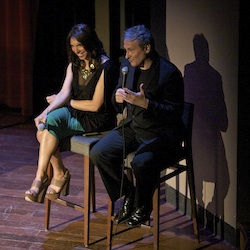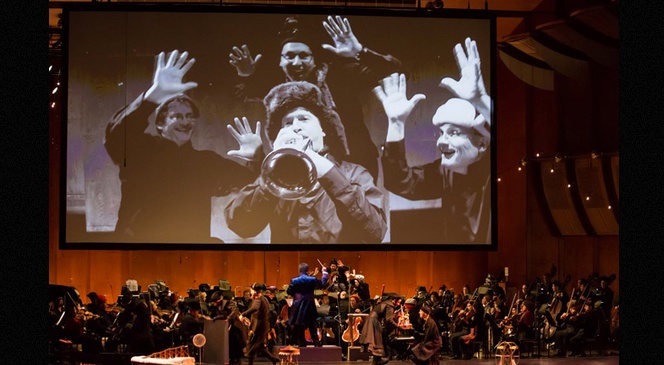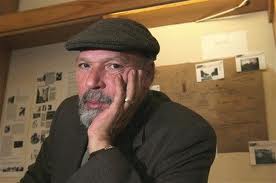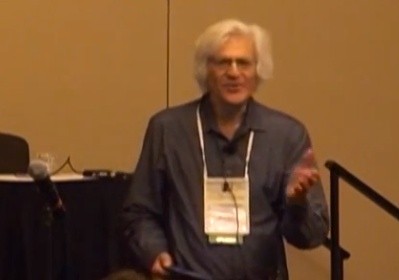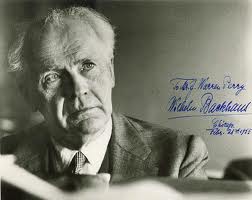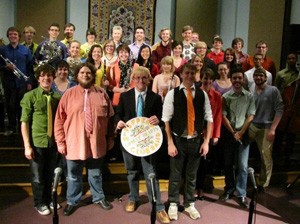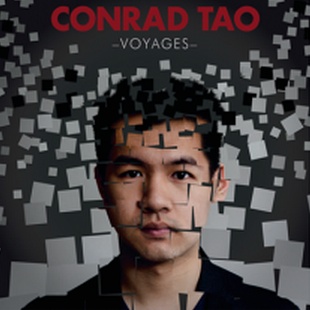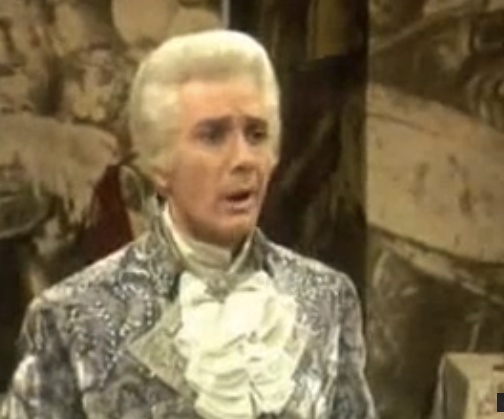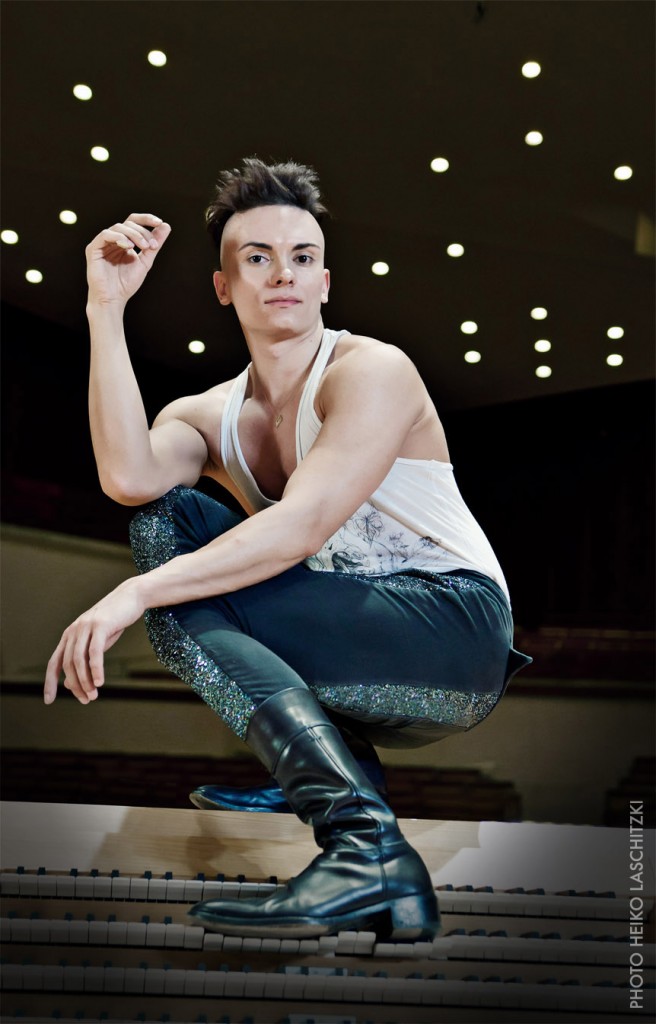To finish my account of the session I led at the League of American Orchestras conference (and sorry for the delay)… The story so far (clicking the link takes you to my last post, where I began this): I asked participants to imagine that in 10 years, all the problems orchestras now have will be solved. They'll have vibrant young audiences, eager support from their communities, no funding problems, and freedom to play any music they like. Yes, that's a dream. But dreams can be freeing. As a first step toward examining this one, I asked … [Read more...]
From Lara Downes: Success and Surprises
[From Greg: Among much else, this is a killer guide to how to promote a concert in our new age, how to develop an audience. The old ways, as Lara notes, don't work in new situations. So we have to do something new. She does it! [I'll add that I saw Chris O'Riley play the DC-area show on the tour Lara describes, and I loved it. He played his new Liszt album, and took Liszt where he belongs, way over the top. Most pianists tame Liszt, consciously or not. But not Chris! And, though he didn't say this publicly, he out-Liszts Liszt in his version … [Read more...]
The Monday post
This must have been delightful: The New York Philharmonic played — and staged — Petrushka, with the musicians as dancers and actors. Here's what happened, as described by Anthony Tommasini in his New York Times review: In this “Petrushka” the musicians, many wearing Russian hats and jackets, played the piece and also the rowdy crowd participating in the festivities, stomping their boots in unison with the downbeats and swaying to the swings of the music like the orchestral equivalent of a wave at a baseball stadium. On a screen above the … [Read more...]
The Friday post
A quiet week. Very little input. So I thought I'd feature this story from the New York Times magazine, about Natalie Jeremijenko, whom we'd trivialize, just a little, by calling an artist, even though her work has been shown in top museums around the world: Four years ago, the Australian-born artist Natalie Jeremijenko stood at the edge of Pier 35 in Downtown Manhattan, trying to start a conversation with some striped bass. Just north of the Manhattan Bridge, she and several collaborators dropped 16 tall buoys into the East River. The buoys … [Read more...]
Imagining more
Continuing about the session I led at the League of American Orchestras conference… The story so far (clicking the link takes you to my last post, where I began this): I asked participants to imagine that in 10 years, all the problems orchestras now have will be solved. They'll have vibrant young audiences, eager support from their communities, no funding problems, and freedom to play any music they like. Yes, that's a dream. But dreams can be freeing. As a first step toward examining this one, I asked everyone to write down three reasons … [Read more...]
Imagining 2023
Suppose in 10 years all problems that orchestras have will be solved! Suppose that orchestras have a vibrant young audience, that people all over the country are talking about what orchestras do. Suppose there aren't funding problems. And that all of this has been accomplished without the slightest artistic compromise. How -- looking back now from this imagined 10-year perspective — would we have gotten there? What would have changed? That was the conversation I led last month at the League of American Orchestras national conference. … [Read more...]
The Monday post
Here's something I've mentioned on the blog before. Also something I assign in my Juilliard course on the future of classical music. But it's worth showing you again. Back in the 19th century, pianists improvised preludes to everything they played in recitals. Preludes either simply to lead into a piece, or maybe also to make a transition between one piece and another. This survived even into the 20th century, into the age of recording. And Wilhelm Backaus -- a great German pianist of the old school was doing it as late as the 1960s. (He … [Read more...]
The Friday post
Quickly, this week: The Music Ride "The Cincinnati Symphony and one hundred people on bikes celebrate their city with The Music Ride ~ a fanfare of kazoos and wheels through the historic neighborhood of Over-the-Rhine." The music (as they don't mention here, or on another site where this is talked about) was the Fanfare for the Common Man. With people on bikes adding a kazoo chorus to the backbone of brass and percussion. Here's the other description: "We gave 100 people a kazoo and a music lesson. Then we all got on our bikes and rode ~ a … [Read more...]
White, low affect, respectful
"I don't know many other art forms where applause is considered a negative." That was a one-liner fired off by Bo Young Lee (in the photo), a diversity consultant, at a League of American Orchestras conference session called "Developing Cross-Cultural Competency." Of course she was talking about the rules of classical music applause. And how, if we follow them, we actually suppress the excitement of our audience. Lee is senior vice president, Global Diversity & Inclusion Lead, at Marsh, Inc., and she'd be a breath of fresh air … [Read more...]
Bewilderment and hope
Last week I was at the League of American Orchestras' national conference, where I led a conversation about dreams. Or, more specifically, about a specific dream — that 10 years from now, orchestras have a lively young audience and vibrant community buzz. Plus all the funding they need, with no artistic compromise. Why aren't we there now? I asked. And, if the dream came true, what would be the steps that got us there? But more on that later. On Facebook a few days ago, I said that at the conference I'd sensed what I might — and in a … [Read more...]
The Monday post
Listen to the overture, on the new Cecilia Bartoli recording of Bellini's Norma. Hot! Giovanni Antonini (the man in the photo) conducts, and the Orchestra La Scintilla plays period instruments. This is the kind of classical performance I like to hear. It has personality. And — as my Juilliard students said this year about classical recordings from past generations — the musicians go for it. Which gives them a marvelous colloquial touch. Sometimes they sound like the town band. That's completely appropriate for bel canto opera, which — … [Read more...]
The Friday post
Last week, when I talked about Jed Distler's piece for grand piano and 128 keyboards, I neglected to say that it's part of a terrific one-day festival -- happening today! — called Make Music NY, which advertises "over 1,000 concerts on streets, sidewalks, and parks" in all five boroughs. Go here for links to what they all are. And Distler's isn't the only massive one. There's a piece by R. Murray Schafer, for 144 singers in rowboats and 11 trombones on shore, unfolding on the lake in Central Park. Plus 21 other mass extravaganzas like … [Read more...]
from Liza Figuroa Kravinsky: Challenging an assumption
I am a composer in her fifties, so a New York Times article about how innovators get better with age piqued my interest. According to the article, The directors of the five top-grossing films of 2012 are all in their 40s or 50s. And two of the biggest-selling authors of fiction for 2012 — Suzanne Collins and E. L. James — are around 50… According to research, the age of eventual Nobel Prize winners when making a discovery, and of inventors when making a significant breakthrough, averaged around 38 in 2000, an increase of about six years … [Read more...]
The Monday post
For anyone who loves opera -—and, maybe, even people who don't — here's an astonishing performance by Franco Corelli, singing "Un di all'azzurro spazio," from Andrea Chenier. Corelli's power, focus, conviction are all so strong that you might get swept away, at least in places, even watching the video without any sound. And with the sound, it's enough to make you believe that Giordano was a great composer. One point I really want to stress: Corelli had an unmatched voice, huge and silvery gold, with soaring high notes that just about define … [Read more...]
The Friday post
Cameron Carpenter, the spectacular indie classical organist, has major news. He's signed a major record deal, with Sony Classical. And he's also unveiling a new organ, which he can take with him everywhere he tours, and play anything from his repertoire. Thus freeing the organ from concert halls and churches. And unleashing Cameron, with lots of well-deserved fanfare, to play more or less anywhere. He'll unveil the new organ with performances at the 2014 Lincoln Center Festival. Of course, some old issues come into play … [Read more...]


